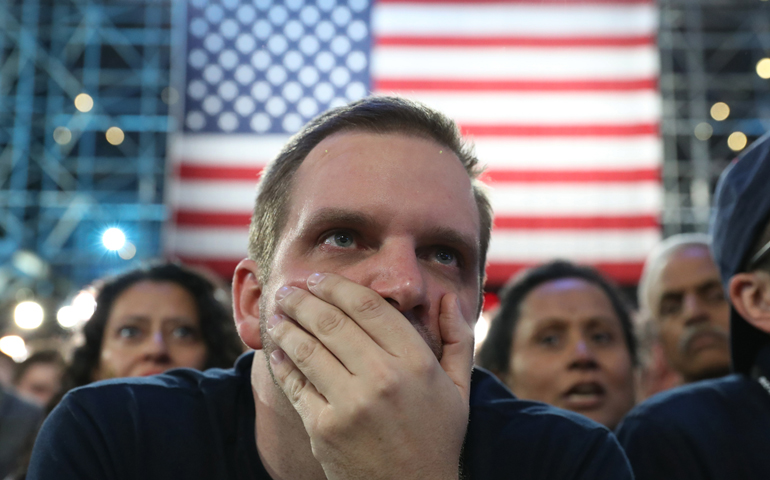
People react to election results Nov. 8 at the Jacob K. Javits Convention Center in New York City . (CNS/Andrew Gombert, EPA)
Speaking with Catholic scholars who study the intersection of religion and politics this morning, it is apparent that the mood is somewhere been fearful and apocalyptic.
Some of the fear is directed at what President-elect Donald Trump will do in office. "I am as yet unable to imagine the future — I can't think about the Supreme Court, the fate of immigrants, race relations, Obamacare, the economy, or any other issue," says Professor Cathleen Kaveny of Boston College. "I cannot get Donald Trump's Twitter feed and the nuclear codes out of my nightmares."
Catholic University professor Stephen Schneck shares Kaveny's concerns and listed a host of issues on which the specter of the nightmare will fall. "Trump will round up and deport million of immigrants. Muslim Americans will be put under repressive scrutiny. Women, the disabled, nonwhites, those who are different, and a broad category Trump calls simply 'losers' must this morning look to their country with fear," says Schneck. "Millions of Americans, mostly those at the lower end of the income scales, will no longer have health care. Social progress on rights for people of color, for gays, for non-Christian religions, and for women will be rolled back. Basic environmental protections written to protect our air and water, and that protect us from dangerous pollutants will be removed. Consumer protection regulations will be tossed. Education standards will be scrapped. Will his political enemies be locked up, like some tin-pot dictator? That's what he promised." It will be interesting to see in the weeks and months ahead how willing Trump is to honor the promises he made, even when the realization of those promises run into political and constitutional hurdles.
Related, from Michael Sean Winters: The disaster that we chose (Nov. 9, 2016)
Matthew Green, who also teaches politics at Catholic University, identifies some deep concerns about a Trump presidency, but also notes how fraught predictions regarding Trump have been. "With Trump's victory we are entering uncharted territory," Green told me. "Never before in our history have we elected a president with no experience in either elected government or military leadership. And as congressional Republicans have pointed out, the presidency has evolved into a far more powerful office than originally envisioned by the Founders."
"In addition, while congressional Republicans have good reasons to rejoice at the prospect of achieving major policy goals with unified government, it's still not clear how much agreement there is between them and Trump," says Green, who specializes in the study of Congress. "In many ways the GOP remains a deeply fractured party. Trump's victory gave credence to those suggesting the party needs to abandon some of its core principles and embrace Trump's nationalist, isolationist, white-identity platform. I expect many Republicans in Congress will be hesitant to do so."
"This is someone whose every gesture speaks of frustration with the rule of law, frustrations with any checks on his 'leadership,' and who yearns for nothing less than authoritarian power," Schneck warns. "Our beloved republic is in grave, grave danger with this election."
Kaveny's take on how this election result, which stunned everyone, came to be touches on some of the deep undercurrents of political life. "In his brilliant discussion of prophets, Abraham Joshua Heshchel talked about three centers of energy: logos (mind), pathos (gut), and ethos (sense of the core community)," Kaveny explains. "Those categories, in my view, are helpful in understanding political leadership more generally. It seems to me what we have seen in Trump's election is a repudiation of a style of leadership centered on logos — or rationally based policy judgments. The priority of a cool, rationalist, and detached approach to policymaking was widely seen to characterize the Obama administration — and the Clintons. In contrast, Trump goes with his gut feeling — and effectively communicated to significant segments of the electorate that he feels their pain, and their frustration at the state of their prospects. Hillary never did that — which explains the popularity of Bernie Sanders."
The soul-searching has begun about how this came to be, and what the result tells us about the state of our country. The prognostications? Who knows. Trump has confounded the commentariat and the pollsters all year: Why would he stop now? But, if he wants to unite the country, he will need to wrestle with the fears these scholars raise.
[Michael Sean Winters is NCR Washington columnist and a visiting fellow at Catholic University's Institute for Policy Research and Catholic Studies.]




